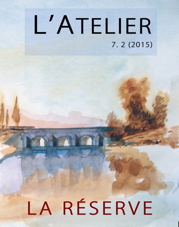Le chant en réserve : lecture de deux poèmes de Louise Glück
Abstract
Dans un court essai intitulé « Au séminaire » de 1974, Roland Barthes affirme que le texte est « en même temps une folle dépense et une réserve inflexible ». Or, c’est dans le tiraillement entre « folle dépense » et « réserve inflexible » que cet article propose de lire deux poèmes de la poète américaine contemporaine Louise Glück : l'aria de « Penelope's Song » du recueil Meadowlands (1996) confesse l'impossibilité même de la confession alors que son lyrisme semble jeter le dire sans aucune réserve. Le poème dit, par sa forme même, la contra-diction, l'opposition comme l'entrelacs entre chant et poème, entre la parole et le corps d'une écriture toujours déjà épuisée. Dans « A Sharply Worded Silence » de Faithful and Virtuous Night, (2014) la parole se trouve prise dans le mince écart entre l'urgence de raconter et le diffèrement infini du dire et de son objet, gardé précieusement en réserve. Cet article se propose de voir comment la poétique de Glück oscille entre écriture et oralité, entre expansion narrative et repli du sujet lyrique sur lui-même. Il s’agit d’étudier comment celle-ci explore ce qui semble être un à-côté du lyrisme sans jamais s’en déprendre.
In a short essay titled "To the seminar" (1974) Roland Barthes stated that the text is "both an irrational expenditure and an inflexible reserve." This article proposes a reading of two poems by contemporary American poet Louise Glück. It explores how these are torn between "an irrational expenditure" and "an inflexible reserve." "Penelope's Song" (Meadowlands 1996) confesses the utter impossibility to confess anything while casting Romantic lyricism away in an ironic aria. The poem and its form are caught in a literal contra-diction, interweaving song and poem, speech and writing. In "A Sharply Worded Silence," (Faithful and Virtuous Night 2014) speech is caught between the urgency of saying something and the endless deferring of the saying itself. Its writing preciously holds meaning in reserve, underneath language while keeping it at bay. This article means to show how Glück's poetics oscillates between writing and orality, between narrative expansiveness and the folding of the lyrical instance on itself. It explores how her poetics examine the very margin of lyricism without ever giving it up.
Published
Issue
Section
License
- Work submitted for publication must be original, previously unpublished, and not under consideration for publication elsewhere. If previously published figures, tables, or parts of text are to be included, the copyright-holder's permission must have been obtained prior to submission.
- Authors of accepted manuscripts will assign to L'Atelier the right to electronically distribute their article, or publish it in any form (Internet, CD ROM, printed copy) but authors will retain copyright and, after the article has appeared in L'Atelier, authors may republish their text (in print and/or electronic form) as long as they clearly acknowledge L'Atelier as the original publisher.


